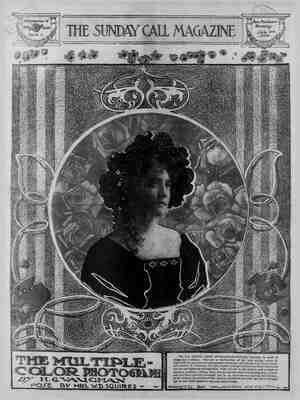The San Francisco Call. Newspaper, January 24, 1904, Page 17
You have reached the hourly page view limit. Unlock higher limit to our entire archive!
Subscribers enjoy higher page view limit, downloads, and exclusive features.
l[ron-Hand Policy Suits Dowager Empress. CzarinaPleadsfor Liberality and Progress. - 23.—Ose of of the present remarkable which Nicholas II e rnment of his ascended the throne eputation of being & keen most the Czar Nicholas IT th shattered h will of his ng man and it he is abso- autocratic ussia, whare is essen- the throne s contest her for would tsteps of his e | Pages 17 t020 THE ” * ~ ’—’—-—r—‘ -———-—* Pages 17 t0 20 : ] FRANCISCO, SUNDAY JANUARY 24, 1904. and an upholder of the Rus- ucricy, which is the Czar’'s t potent instrument in ruling per- sonally over so many millions of sub- Jects distributed over two continents. The Czar’s wife, on the cogtrary, is grasp the medieval THE HAUGHTY SRAND DUCHESS | MARIE PAVLOVNA THE CZAR.S BITTEREST ENEMY BETWEEN FORCE OF A STRONG MOTHER AND CHARITY OF A DEVOTED WIFE THE CZAR HALTS AND THE WORLD SAYS HE IS A WEAK MAN ‘ur Dowacrr_ CZARINA “WHO QONTENDS <~ITH HER. VGHTER.-IN-LAW FOR. INFLUENGS. <OUNTESS IUBOMIRSKI | WHO ¥As <SREA" INFIL OVER, THE caaz - o=NE OVER THE CZAR__ | —_——ps- // - ! MOTHER AND WIFE OF THE CZAR OF RUSSIA WHO WOULD DI- RECT HIS POLITICAL DESTINY AND THE WOMAN WHO IS STRIVING FOR HIS DOWNFALL. i i — peal so sirongly to the Slavs, with their lower degree of culture, civiliza- tion and enlightenment. Necessity compelled her to embrace the orthodox Greek faith when she married Nicho- las, but her conversion was purely for- mal, and she remains at heart true to Lutheran Presbyterianism, the religion of her childhood. In politics, too, the Asiatic ideas which prevail at the Rus- sian court are abhorrent to her, and she regards the reactionary advisers of the Czar, including her own mother-in-law, as the worst enemies of Russia. CZARINA IS PROGRESSIVE. — <+ All the influence the Czarina pos- sesses her imperial husband is ex- the embodiment of open-minded liber- i alism. Her Anglo-German mind cannot erted to make him a progressive west- which ap- ern monerch instead of an eastern po- o+ tentate glorying in Asiatic conditions of semi-barbarism. She Has pleaded repeatedly for malcontent students who have got into trouble by demon- strating their political opinions too vig- orously; she has espoused the cause of strikers; she has championed the rights of the Jews, who can be baited wifh impunity throughout Russia; she has represented to her husband the injus- tice of suppressing Polish nationalism by blood-and-iron methods, and she has warmly advocted a more merciful treatment of the liberty-loving, patri- otic Finns. Needless to say, during the nine years of the Czar's reign, the Czarina and her mother-in-law have come into sharp collision over political affairs on numerous occasions. ) The Czar wavers continuously be- tween allegiance to his wife and to his mother. He loves his wife, but he fears his mother, and it is a constant strug- gle between love and fear.. Sometimes the one gets the upper hand, sometimes the other, hence the zigzag course of the Czar's policy visible to the world. It is a matter of common gossip in Russian court circles that the two im- perial ladies from time to time have lively passages ~? arms over their di- vergent political views. Shortly after the recent Kishenev -riots, when so many Jews were massacred, there was quite a scene between the Dowager Empress and her daughter-in-law in the Czar/s study one morning. The Czarina urged that the Kishenev mas- sacres disgraced Russia in the eyes of ) the civilized world and cast a blot on her husband’s honor, while the Dow- ager Empress maintained that no one whose opinion was worthy of consid- eration cared whether there were a few Jews more or less in the world and that the protests made in western countries were engineered by an in- significant minority of uninfluential and sentimental or interested no- bodies. The Grand Duchess Marie Pavlovna, the wifeyof the Czar’s uncle and heir presumptive, Grand Duke Vladimir, is the most formidable and most gerous of the women who exercise political influence on the Russian Em- peror. This ambitious woman covets the throne of Russia for her husband and for her son and her whole career has been devoted to the task of under- mining the present Czar's position. Whenever she can contribute to the accomplishment of something likely to weaken the Czar’s position she exerts her whole strength to bring it about. She has sought to make the Czar ridi- culous in the eyes of the nobility and to represent him In an unfavorable light to the masses of the Russian people. Her influence is exercised most- ly \indirectly, throuch her husband, whose position as next in line to the throne after the Czar’s rather sickly younger brother makes him a person- age of great power and importance. The Grand Duchess also operates through members of a court clique, which is ill-disposed toward Nicholas II, and through newspapers which are in receipt of subventions from her. She is by far the cleverest of the women around the Czar and had her influence been exerted to strengthen his position and to contribute to the success of his reign instead of the re- verse Nichelas II might go down to history with a reputation very differ- ent from the one which posterity seems likely to accord to him,
